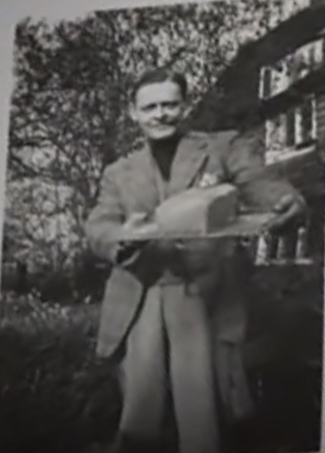For Baker Beck…
In the 1930s T.S. Eliot often lived in the country at Frank Morley’s farm in Sussex.1 He learned to bake bread there and is pictured here with one of his loaves.
The life-long inspiration of Eliot for McLuhan is already reflected in his letter to his family in Canada during his first term at Cambridge in 1934 (when McLuhan was 23):
Of late I have been wayfaring among the work of T.S. Eliot. He is easily the greatest modern poet, and just how great he is remains to be seen, because he has not produced his best yet. However the poems I am reading (ed. Faber & Faber: Poems 1909-1925) have the unmistakable character of greatness. They transform, and diffuse and recoalesce the commonest every day occurrences of 20th cent, city life till one begins to see double indeed — the extremely unthinkable character, the glory and the horror of the reality in life yet, to all save the seer, [only, if at all] behind life, is miraculously suggested. (Eliot is an anglo-Catholic, a theologian and philosopher and one of the best critics who ever wrote in English) Now there is something ineffably exciting in reading a man, a genius and a poet, who has by the same stages, in face of the same circumstances, (he is an American) come to the same point of view concerning the nature of religion and Christianity, the interpretation of history, and the value of industrialism. There is scarcely a modern “intellectual” who has the background of opinion necessary to enjoy Eliot — yet they have one and all heralded him and ranted about him; while he has necessarily been amused by their efforts to show that his poetry “dispenses with all creeds and beliefs”!
(…)
[Eliot’s] poems (…) use the method of dramatic monologue with its swift ranging over every sort of experience. But Eliot’s “consciousness” is not that of a lover, a count, or a distinct individual — it is impersonal and universal and instead of (…) individual associations he ranges over all history and all modern society…2
44 years later, one of McLuhan’s last public lectures3 would be given on Eliot as the Pound Lecture in the Humanities at the University of Idaho: ‘The Possum and the Midwife’.4
- Frank Morley was a director of Faber & Faber, where Eliot worked as an editor. Both were Americans. ↩
- Letter to Elsie, Herbert & Maurice McLuhan from December 6, 1934 in Letters 41-43. ↩
- The Pound Lecture was given April 25, 1978. The next year McLuhan suffered the stroke from which he would die in 1980. ↩
- McLuhan’s Pound Lecture was published in somewhat altered form in 1979 as ‘Pound, Eliot, and the Rhetoric of The Waste Land’ (New Literary History, 10:3). ↩
